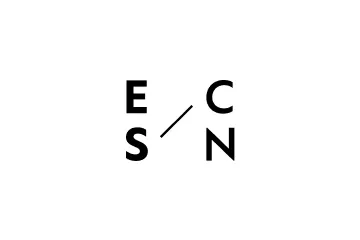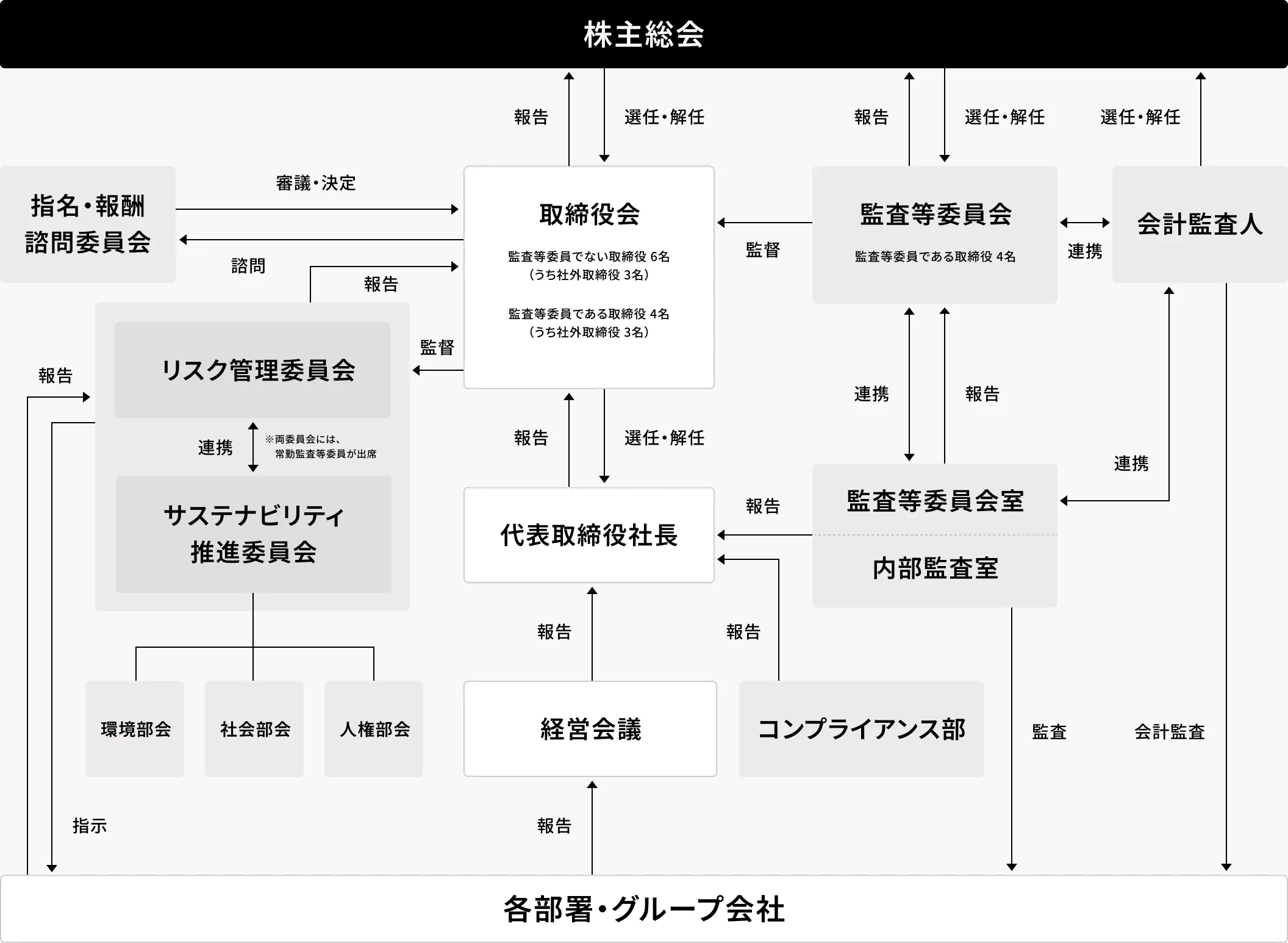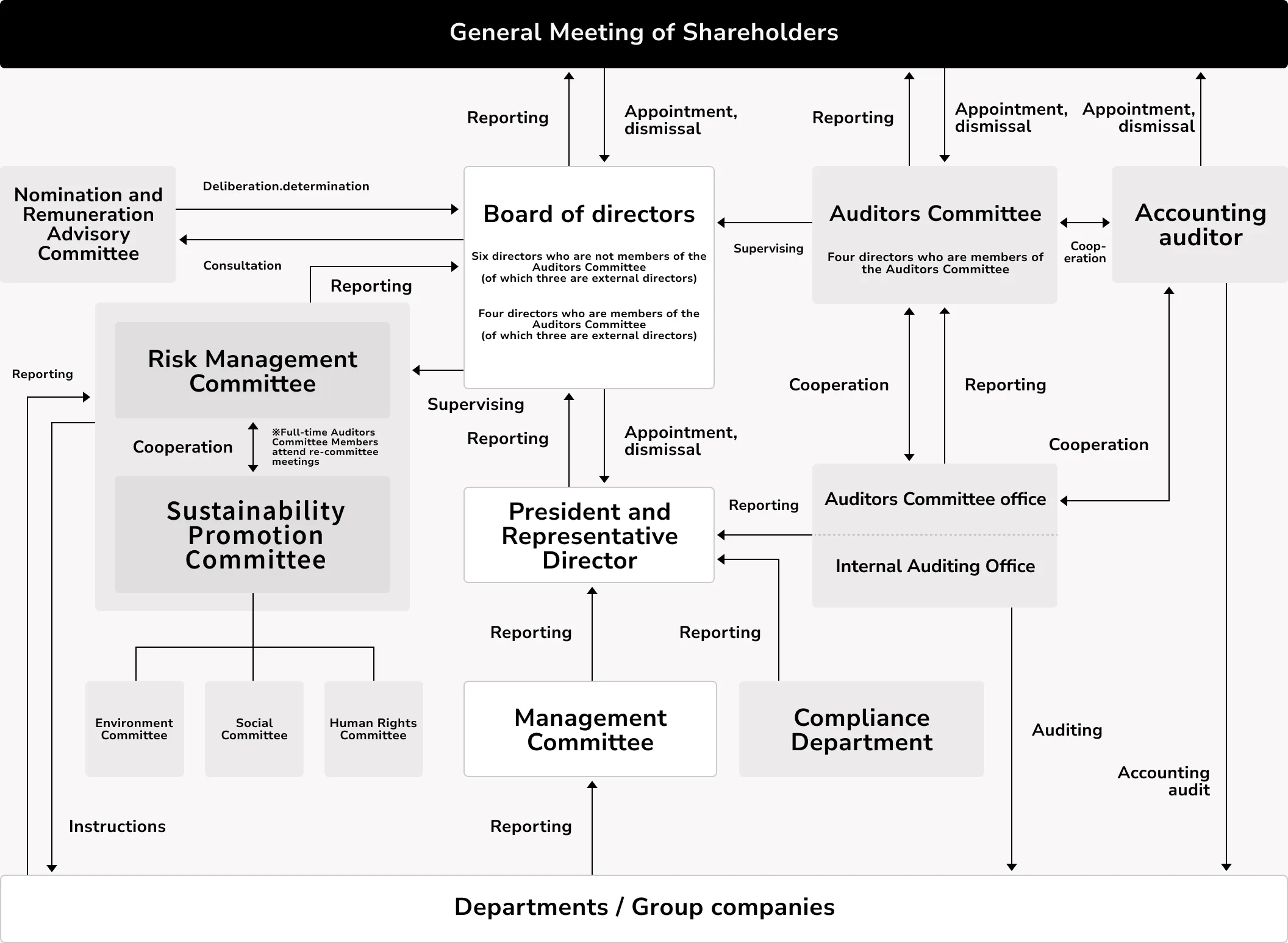© ES-CON JAPAN Ltd.
Sustainability
Corporate Governance
Corporate Governance
1. Corporate Governance System
ES-CON JAPAN Ltd. is a company with Auditor, and the Board Director and Auditor manage, supervise, and audit business execution.
(1) Board Director
The Board of Director consists of 10 members, including 3 executive Director, 3 non-executive Director, and 4 Director who are Auditor. (To enhance management oversight, all 3 non-executive Director and 3 of the 4 Director who are Auditor are Outside Director, a total of 6 of whom are independent Outside Director.)
- In principle, the committee meets at least once a month, and important matters are thoroughly deliberated and discussed to enhance management oversight.
- In order to ensure the promptness and agility of business execution, decision-making regarding important business operations is delegated to executive Director in accordance with the Articles of Incorporation. The scope of delegation is strictly managed in accordance with the standards regarding monetary amounts, etc., set forth in the "Administrative Authority Regulations" approved by the Board of Director, and the execution status of important delegated operations is required to be reported to the Board Director promptly.
(2) Auditor
Auditor is made up of four members, three of whom are independent Outside Director in order to enhance its management oversight function and its independence.
- In principle, Auditor meets once a month, and at the request of Auditor, accounting auditors, internal audit personnel, executive Director, and other senior management members attend the meetings as appropriate and provide timely and accurate reports.
- Auditor regularly exchange opinions with the President and President and Representative Director, and meet with executive Director and other management executives as necessary, striving to understand the status of business execution and issues in each business division.
- The full-time Auditor attends important meetings such as the Management Meeting and Division Meetings, which are held regularly and attended by the Executive Director and executives of each business division, and shares information on the management situation and progress of business plans.
- The Audit and Supervisory Committee reviews important documents such as approval documents, cooperates with accounting auditors and the internal audit department, and audits the legality and appropriateness of Director' execution of their duties. In addition, two full-time members have been appointed as Auditor, further strengthening governance.
(3) Nomination and Remuneration Advisory Committee
As an advisory body to the Board of Director, it deliberates and decides on the nomination and remuneration of Director.
The majority of the committee members are Outside Director, strengthening independence and transparency regarding nominations and remuneration.
(4) Skills Matrix
| full name | Takatoshi Ito | Minoru Nakanishi | Masakazu Tsubouchi | Keiko Otsuki *1 | Hiroaki Hattori *1 | Hiroko Kiba *1 | Masayoshi Nishitake *1 | Tomohiko Wakayama | Hiroto Mizobata *1 | Tadashi Fukuda *1 | Tomohiko Egashira *2 | Akira Mizunoya *2 |
|---|---|---|---|---|---|---|---|---|---|---|---|---|
| Corporate Management/Business Strategy | ◎ | ◎ | ◎ | ○ | ○ | ○ | ○ | ○ | ○ | |||
| Real estate business/urban development | ◎ | ○ | ○ | ○ | ◎ | ◎ | ||||||
| Finance/Accounting | ○ | ◎ | ◎ | ◎ | ◎ | ○ | ◎ | ◎ | ||||
| Compliance/Risk Management | ○ | ○ | ○ | ○ | ○ | ◎ | ◎ | ◎ | ◎ | |||
| ESG/Sustainability | ○ | ○ | ○ | ○ | ◎ | ○ | ||||||
| Human Resources/Diversity | ○ | ○ | ○ | ◎ | ○ | |||||||
| DX | ○ | ○ |
*1: The Company has filed a notice of independence with Tokyo Stock Exchange as an independent director.
*2 This is a delegated Executive Officer
◎ Extremely skilled, ○ Highly skilled
2. Reasons for choosing the current corporate governance structure
- Director who are members of Auditor Committee have voting rights on proposals at Director meetings, thereby strengthening the supervisory function and effectiveness of the Board of Director.
- By delegating important business operations to Director, we ensure speed, agility, and flexibility in business execution and prevent the loss of business opportunities.
- Director who are Auditor will have the right to express opinions regarding the nomination and remuneration decisions of other Director, and by doing so will be more involved in the nomination and remuneration decision-making process, transparency will be strengthened.
- Director Nomination and Remuneration Advisory Committee, an advisory body to the Board of Directors with a majority of Outside Director, deliberates and makes decisions on the nomination and remuneration of Director other than Director who are Auditor (draft decisions on individual remuneration amounts, remuneration policies, etc., and draft decisions on nomination and reappointment), which we believe will contribute to further strengthening the independence and objectivity of Director nomination and remuneration.
- To ensure the effectiveness of audits, Auditor, the internal audit department and the accounting auditor maintain close collaboration with each other.
Through these efforts, we believe that the current governance structure is optimal for contributing to the sustainable enhancement of ES-CON JAPAN Ltd. corporate value.
3. Status of efforts to respect the positions of stakeholders
(1) Stipulate in-house regulations regarding respect for the positions of stakeholders
In line with the "purpose," "vision," and "code of conduct" defined in our management philosophy, ES-CON JAPAN Ltd. are constantly striving to be a company that is perpetually needed by society by continuing to create a "new future" that is rooted in the local community and that is unique to all stakeholders. Based on this philosophy, we will increase value for all stakeholders through the following activities.
- Based on the "Employee Rulebook" and "Basic Policy for Human Resource Development" (basic requirements for human resources), we will strive to develop human resources that will enable the sustainable improvement of corporate value.
- Based on our "Compliance Declaration," we will deal with all stakeholders in a fair, impartial, and sincere manner.
- We will implement timely disclosure of management information, including non-financial information, increase corporate value, and actively return profits to shareholders.
- Based on our "Principles of Conduct" and "Code of Corporate Ethics," we will conduct our business operations with all stakeholders in mind.
(2) Implementing environmental conservation activities, CSR activities, etc.
One of ES-CON JAPAN Ltd. key management strategies is to address social issues through the promotion of sustainability management. We are promoting company-wide initiatives led by Sustainability Promotion Committee, and are focusing on improving our intrinsic corporate value, which cannot be measured by financial information alone.
(3) Formulation of policies regarding the provision of information to stakeholders
Our "Charter of Corporate Ethics" and "Compliance Declaration" stipulate our efforts to ensure transparency and openness toward stakeholders.
4. Compliance
For more information on compliance, please refer to the "Compliance (Compliance with Laws and Regulations)" page.

5. Corporate Governance Structure




